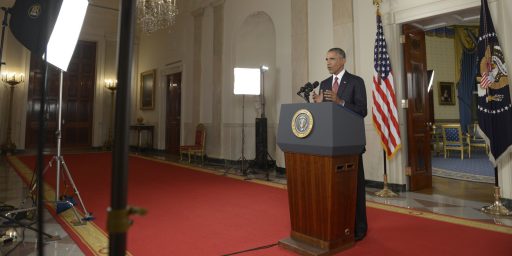No House Vote On Syria Resolution If Votes Aren’t There?
Would House Republicans really defer from voting on a Syria resolution to prevent embarrassing the President on the world stage?
National Review’s John Fund passes along a report that top Congressional Republicans may not bring the Syria resolution to the floor if its apparent that it would be defeated:
Congressional aides in both parties tell me that the chances of President Obama winning House approval for military action in Syria are so bad they actually doubt the House would ultimately vote on it if failure seemed certain.
(…)
“I just don’t believe that if defeat is certain, the House leadership will want to see a president utterly humiliated on the House floor in a public vote,” one top aide to the Republican leadership told me. Should the full Senate vote to approve an attack on Syria — as still appears somewhat likely — the battle would shift to the House. “An attempt would be made to let the whole thing go away. I don’t think it would be done to give the GOP any extra leverage in debt-ceiling or budget negotiations — Obama isn’t the grateful type — but simply because the weakness it would demonstrate wouldn’t be good for the country,” the aide told me.
It’s worth noting, of course, that this is coming from unnamed aides rather than from anyone who is actually part of leadership, so it’s worth taking the report with a grain of salt. Nonetheless, it does raise an interesting point. President’s have lost House votes in the past, but it’s always been on domestic issues. I can’t say I’ve done any significant research on the matter, but I’m fairly certain that there’s no real precedent in recent American history for a situation where a President seeking authorization to use military force has failed to obtain Congressional approval after having made taking that action known to the world in the manner that President Obama had. It’s unclear what impact that would have on the President’s ability to persuade other nations to act on other issues in the future, and one would think that the White House took this possibility into account when they made the decision to take the matter to Congress.
The cynical political observer, of course, will scoff at the idea that House leadership would desire to cut the President a break on this vote out of some sense of patriotism. For the past four and a half years, Republicans have thought nothing of challenging the President at every turn, often under the observation of the rest of the world. Indeed, one could point to the Debt Ceiling debate of Summer 2011 as an example of the House doing exactly what this aide says he doesn’t think they’d want to do this time. Turning down a Presidential request like this would be virtually unprecedented and would arguably be very politically damaging to the President. Why wouldn’t Republicans want to see that happen if they had the power to do so?
Even assuming, though, that the House leadership decided to defer on a vote for the “good of the country,” it’s not clear that this would have any real impact on how the rest of the world reacts. If there’s no vote, and the President doesn’t act on his own, then the consequences would largely be the same as if the House had rejected the resolution. Additionally, it strikes me that not holding a vote on something as important as this would be something of a cop-out. Throughout August, many Members of Congress were calling on the President to seek Congressional authorization before making any move on Syria. As I’ve explained before, I think that this was the right position to take. Like President’s before him, President Obama initially took the position that he didn’t need to seek authorization for the kind of attack he hand in mind. Then, he changed his mind, and made the right decision. Now that the ball is in Congress’s court, they owe it to the country to go on the record, even if it means a rejection of the President’s request. Otherwise, they’re not really doing their job.






I’m fairly certain that there’s no real precedent in recent American history for a situation where a President seeking authorization to use military force has failed to obtain Congressional approval after having made taking that action known to the world in the manner that President Obama had.
1999, Yugoslavia.
The more interesting question is whether the authorization bill will make it to the floor of the Senate.
@mantis: Slightly different, but support for the Contras and the South Vietnamese.
It will be fascinating to see what happens. This could turn into Obama’s biggest nightmare. If he realizes he is potentially going to lose a vote in The House what can he do to salvage credibility? How about getting a UN agreement with Putin! Mad though is sounds it may be easier than winning a vote in The House.
“I just don’t believe that if defeat is certain, the House leadership will want to see a president utterly humiliated on the House floor in a public vote,” one top aide to the Republican leadership told me.
This guy is either a troll or a moron. There is nothing this House wants besides seeing this president utterly humiliated on the House floor in a public vote.
I don’t see this happening unless it’s WAY clear, like 350+ declared nay’s, that the resolution will fail. Two reasons for this. First of all, a president has access to a lot of levers that other people have never even imagined. The President can always offer a mid-level post at HUD to the popular mayor in your district’s largest city who’s been eyeing your Congressional seat. He can give you credit in a letter he writes to the boss of a union that’s strong in your district. He can threaten to crush your pet project, name a recruitment center after your dad, get every major contributor in your state to pour money into a Senate race, or who knows what else. He can also appeal to your patriotism and/or party loyalty. If a president has to, he should be able to pick up 50 aye’s within 24 hours of a major vote.
Secondly, voters’ memories are long, but terribly inaccurate. The House leadership won’t stick their necks out if the history books or op-ed writers are going to say that they woudln’t even give the President a vote on Syria. There are too many ways to portray a lack of a vote in a negative light.
To add to that last point: the rest of the world doesn’t understand our system at all. If the House fails to vote on a president’s resolution, that can look just as bad as if the House votes against it. Is some Georgian going to feel more secure about the free world knowing that the House prevented a vote on a bill that President Obama wanted? No, he’s not going to get the nuance of it. He’s appraising the strength of Russia and the West using his own formula.
So much for a vote that puts everybody on the record.
I hope that our so-called political leadership can somehow ensure that Congress goes on the record on this issue.
@mantis:
Congress didn’t vote on Yugoslavia until after President Clinton had already committed American forces to the mission.
If the President asks for authorization to use military force, the Congress really should at least vote on it. Especially if they want to break the long-running tradition of Presidents committing forces without asking for approval.
Or, in crazy right-wing speak, Assad isn’t the only dictator that needs to receive a message.
@wr: If you want to have cartoon characters of politicians dancing in your head, that’s fine, but they’re getting in the way of your understanding of how real 3-D politicians think and act.
@Pinky: Yes, Pinky. Be sure to post that again after they vote to repeal Obamacare for teh 45th time.
The cartoon characters aren’t in my head, they’re in your party.
@Dave Schuler:
I made note of that possibility earlier today. Personally, I am of the opinion that, the matter having been submitted to Congress, then Congress should vote on it regardless of the outcome
@Doug Mataconis:
Congress didn’t vote on Yugoslavia until after President Clinton had already committed American forces to the mission.
True, but they still failed to authorize it in the vote. Does it make any difference, though? If it does, then what that says is a president should just start bombing if he wants to, and then if Congress votes against it he should just ignore them because the can of worms is already open. I don’t think that’s what you’re advocating, but it follows logically.
@al-Ameda:
This is the issue. The House does not care about humiliating the President. The House cares only about going on record opposing or supporting military strikes — and the conflicted and non-predictable way that affects them in their primary races next year.
@Tony W:
Yup. No one who was demanding it ever really wanted a congressional vote. Every House member who would like nothing better than to stick it to the President to prove themselves to their base also really doesn’t want to have put down that official marker when the next CW atrocity occurs.
@mantis: Well Hello, guess what, there IS a first time for everything!